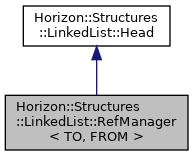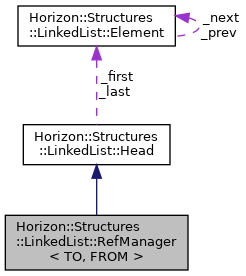This class is used to manage a linked list of References. It is not intended to be used directly. It is used as a base class for other classes that need to manage a linked list. The Head class is a friend of this class to allow it to access the private members of this class. The functionality of this class is identical to the Element class except that it is used to manage a linked list of References. The RefManager can be used to manage a linked list of References to any type of object. The object type is specified by the TO template parameter. And the type of object that the Reference is managing is specified by the FROM template parameter. By default the TO and FROM template parameters are the same type. But they can be different types if the Reference is managing a base class of the object. The reference list is a doubly linked list. The list is circular so the first element's previous element is the last element and the last element's next element is the first element. The reason we link the TO and FROM objects together is so that we can easily invalidate all the References in the list when the FROM object is destroyed. By creating a dynamic responsibility chain between the ReferenceManager and the Reference, we can provide a simple and efficient way to manage a linked list of References and visit objects of a specific type by using the ReferenceManager. More...
#include <RefManager.hpp>
 Inheritance diagram for Horizon::Structures::LinkedList::RefManager< TO, FROM >:
Inheritance diagram for Horizon::Structures::LinkedList::RefManager< TO, FROM >: Collaboration diagram for Horizon::Structures::LinkedList::RefManager< TO, FROM >:
Collaboration diagram for Horizon::Structures::LinkedList::RefManager< TO, FROM >:Public Types | |
| typedef Head::Iterator< Reference< TO, FROM > > | iterator |
 Public Types inherited from Horizon::Structures::LinkedList::Head Public Types inherited from Horizon::Structures::LinkedList::Head | |
| typedef Iterator< Element > | iterator |
Public Member Functions | |
| RefManager () | |
| Reference< TO, FROM > * | first () |
| Returns the first Reference in the list. More... | |
| Reference< TO, FROM > const * | first () const |
| iterator | begin () |
| Returns the iterator at the beginning of the list. More... | |
| iterator | end () |
| Returns the iterator at the end of the list. More... | |
| virtual | ~RefManager () |
| void | clear_all () |
 Public Member Functions inherited from Horizon::Structures::LinkedList::Head Public Member Functions inherited from Horizon::Structures::LinkedList::Head | |
| Head () | |
| bool | is_empty () const |
| Returns true if the list is empty. More... | |
| Element * | first () |
| Returns the first Element in the list. More... | |
| Element const * | first () const |
| Element * | last () |
| Returns the last Element in the list. More... | |
| Element const * | last () const |
| void | push_front (Element *pElem) |
| push_front() and push_back() are used to add an Element to the list. More... | |
| void | push_back (Element *pElem) |
| uint32_t | get_size () const |
| returns the number of Elements in the list (not including the head and tail Elements or the first and last Elements) More... | |
| void | inc_size () |
| void | dec_size () |
Additional Inherited Members | |
 Protected Member Functions inherited from Horizon::Structures::LinkedList::Head Protected Member Functions inherited from Horizon::Structures::LinkedList::Head | |
| ~Head () | |
Detailed Description
class Horizon::Structures::LinkedList::RefManager< TO, FROM >
This class is used to manage a linked list of References. It is not intended to be used directly. It is used as a base class for other classes that need to manage a linked list. The Head class is a friend of this class to allow it to access the private members of this class. The functionality of this class is identical to the Element class except that it is used to manage a linked list of References. The RefManager can be used to manage a linked list of References to any type of object. The object type is specified by the TO template parameter. And the type of object that the Reference is managing is specified by the FROM template parameter. By default the TO and FROM template parameters are the same type. But they can be different types if the Reference is managing a base class of the object. The reference list is a doubly linked list. The list is circular so the first element's previous element is the last element and the last element's next element is the first element. The reason we link the TO and FROM objects together is so that we can easily invalidate all the References in the list when the FROM object is destroyed. By creating a dynamic responsibility chain between the ReferenceManager and the Reference, we can provide a simple and efficient way to manage a linked list of References and visit objects of a specific type by using the ReferenceManager.
Member Typedef Documentation
◆ iterator
| typedef Head::Iterator<Reference<TO, FROM> > Horizon::Structures::LinkedList::RefManager< TO, FROM >::iterator |
Constructor & Destructor Documentation
◆ RefManager()
|
inline |
◆ ~RefManager()
|
inlinevirtual |
References Horizon::Structures::LinkedList::RefManager< TO, FROM >::clear_all().
 Here is the call graph for this function:
Here is the call graph for this function:Member Function Documentation
◆ begin()
|
inline |
Returns the iterator at the beginning of the list.
References Horizon::Structures::LinkedList::RefManager< TO, FROM >::first().
 Here is the call graph for this function:
Here is the call graph for this function:◆ clear_all()
|
inline |
References Horizon::Structures::LinkedList::RefManager< TO, FROM >::first().
Referenced by Horizon::Structures::LinkedList::RefManager< TO, FROM >::~RefManager().
 Here is the call graph for this function:
Here is the call graph for this function: Here is the caller graph for this function:
Here is the caller graph for this function:◆ end()
|
inline |
Returns the iterator at the end of the list.
◆ first() [1/2]
|
inline |
Returns the first Reference in the list.
References Horizon::Structures::LinkedList::Head::first().
Referenced by Horizon::Structures::LinkedList::RefManager< TO, FROM >::begin(), and Horizon::Structures::LinkedList::RefManager< TO, FROM >::clear_all().
 Here is the call graph for this function:
Here is the call graph for this function: Here is the caller graph for this function:
Here is the caller graph for this function:◆ first() [2/2]
|
inline |
References Horizon::Structures::LinkedList::Head::first().
 Here is the call graph for this function:
Here is the call graph for this function:The documentation for this class was generated from the following file:
- src/Core/Structures/LinkedList/ReferenceList/RefManager.hpp








